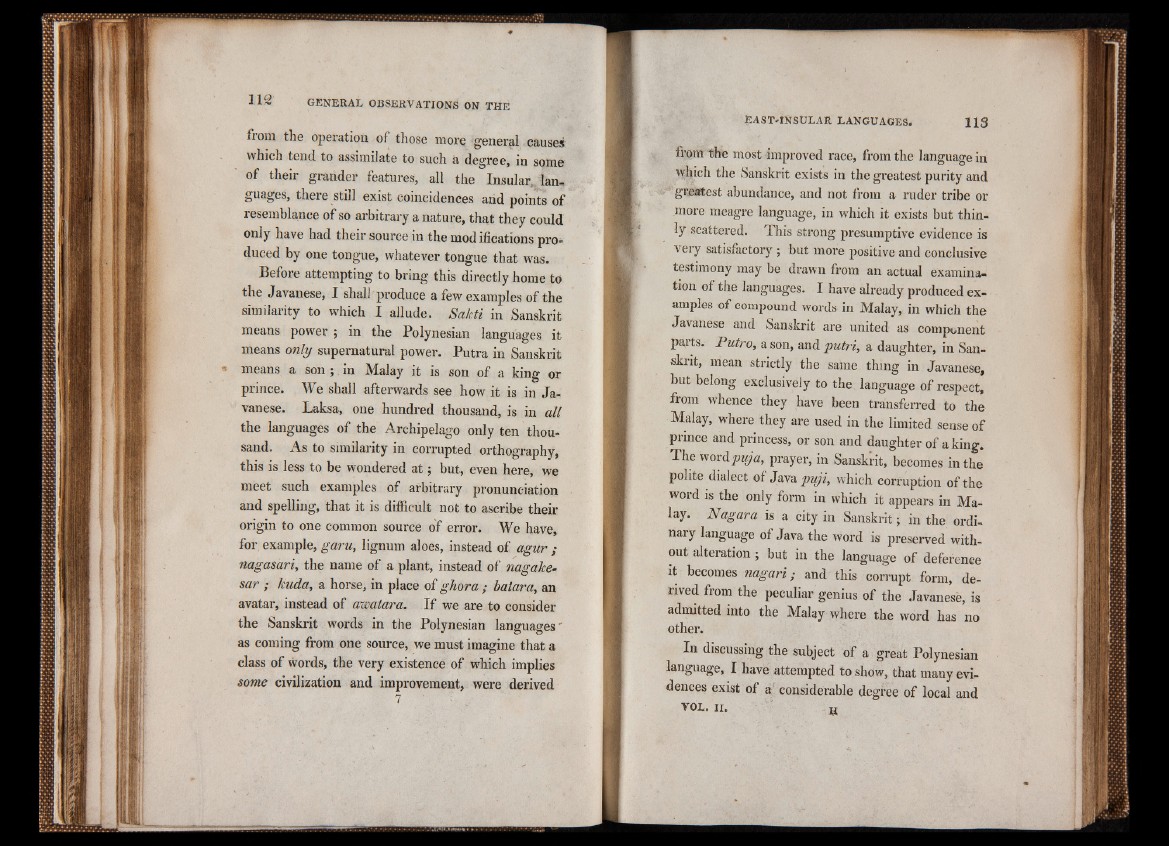
from the operation of those more general causes
which tend to assimilate to such a degree, in some
of their grander features, all the Insular, lan,
guages, there still exist coincidences arid points of
resemblance of so arbitrary a nature, that they could
only have had their source in the mod ifications produced
by one tongue, whatever tongue that was.
Before attempting to bring this directly home to
the Javanese, I shall produce a few examples of the
similarity to which I allude. Sakti in Sanskrit
means power ; in the Polynesian languages it
means only supernatural power. Putra in Sanskrit
means a son y in Malay it is son of a king or
prince. We shall afterwards see how it is in Javanese.
Laksa, one hundred thousand, is in all
the languages of the Archipelago only ten thousand.
As to similarity in corrupted orthography,
this is less to be wondered a t; but, even here, we
meet such examples of arbitrary pronunciation
and spelling, that it is difficult not to ascribe their
origin to one common source of error. We have,
for, example, garu, lignum aloes, instead of agur ;
nagasari, the name of a plant, instead of nagake-
sar ; kuda, a horse, in place of ghora ; batara, an
avatar, instead of awatara. If we are to consider
the Sanskrit words in the Polynesian languages'
as coming from one source, we must imagine that a
class of words, the very existence of which implies
some civilization and improvement, were derived
7
from the most improved race, from the language in
which the Sanskrit exists in the greatest purity and
greatest abundance, and not from a ruder tribe or
more meagre language, in which it exists but thinly
scattered. This strong presumptive evidence is
veiy satisfactory ; but more positive and conclusive
testimony may be drawn from an actual examination
of the languages. I have already produced examples
of compound words in Malay, in which the
Javanese and Sanskrit are united as component
Parts. Putro, a son, and putri, a daughter, in Sanskrit,
mean strictly the same thing in Javanese,
but belong exclusively to the language of respect,
from whence they have been transferred to the
Malay, where they are used in the limited sense of
prince and princess, or son and daughter of a king«
The word puja, prayer, in Sanskrit, becomes in the
polite dialect of Java puji, which corruption of the
word is the only form in which it appears in Malay.
Nagar a is a city in Sanskrit; in the ordinary
language of Java the w'ord is preserved without
alteration ; but in the language of deference
it becomes nagari; and this corrupt form, derived
from the peculiar genius of the Javanese, is
admitted into the Malay where the word has no
other.
In discussing the subject of a great Polynesian
language, I have attempted to show, that many evidences
exist of a‘ considerable degree of local and
VOL. II.